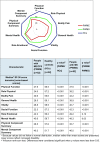Functional Status and Well-Being in People with Myalgic Encephalomyelitis/Chronic Fatigue Syndrome Compared with People with Multiple Sclerosis and Healthy Controls
- PMID: 29536371
- PMCID: PMC6249197
- DOI: 10.1007/s41669-018-0071-6
Functional Status and Well-Being in People with Myalgic Encephalomyelitis/Chronic Fatigue Syndrome Compared with People with Multiple Sclerosis and Healthy Controls
Abstract
Background: People with myalgic encephalomyelitis/chronic fatigue syndrome (ME/CFS) continue to struggle to have their condition recognised as disabling in the face of public and professional prejudice and discrimination.
Objective: The aim of this study was to compare the functional status and well-being of people with well-characterised ME/CFS with people with multiple sclerosis (PWMS), as well as healthy controls (HCs).
Methods: In this cross-sectional study, we used data collected as part of the UK ME/CFS Biobank to compare actual participant scores from the Medical Outcomes Survey Short Form-36 v2™ (SF-36v2™) between groups, as a proxy for impact of disability, and from a bespoke questionnaire seeking data on employment and income.
Results: People with ME/CFS scored significantly lower than PWMS or HCs in almost all SF-36v2™ areas. Prominent were lower scores for people with ME/CFS in the Physical Component Summary and Role Physical and Social Function domains, while the smallest differences were seen in the Mental Health domain. Responses to the bespoke questionnaire indicated that people with ME/CFS in this study work fewer hours and have lower incomes compared with people in the other two groups.
Conclusions: Using SF-36v2™ scores as a proxy, people with ME/CFS were measurably more disabled than PWMS or HCs in this study population. Furthermore, employment and income data are consistent with loss of functional status. These findings should encourage the health community to recognise the disabling effects of ME/CFS, to advocate for the needs of people with ME/CFS, and to investigate strategies to address the cost of the disease to both individuals and society.
Conflict of interest statement
Conflicts of Interest
Caroline Kingdon, Erinna Bowman, Hayley Curran, Luis Nacul, and Eliana Lacerda declare that they have no conflicts of interest.
Human Participants
All procedures performed in studies involving human participants were in accordance with the ethical standards of the institutional and/or national research committee and with the 1964 Helsinki declaration and its later amendments or comparable ethical standards.
Ethical Approval
The UK ME/CFS Biobank received ethical approval from the London School of Hygiene & Tropical Medicine (LSHTM) Ethics Committee (ref. 6123), the National Research Ethics Service (NRES) London-Bloomsbury Research Ethics Committee (REC; ref. 11/LO/1760, IRAS ID: 77765), and the NHS Research Governance and Developments Offices (R&D), which oversee the recruitment of research participants from government health services.
Informed Consent
Written informed consent was obtained from all individual participants included in the study. Participants were encouraged to ask questions and were free to withdraw at any time.
Figures





Similar articles
-
A logistic regression analysis of risk factors in ME/CFS pathogenesis.BMC Neurol. 2019 Nov 7;19(1):275. doi: 10.1186/s12883-019-1468-2. BMC Neurol. 2019. PMID: 31699051 Free PMC article.
-
The functional status and well being of people with myalgic encephalomyelitis/chronic fatigue syndrome and their carers.BMC Public Health. 2011 May 27;11:402. doi: 10.1186/1471-2458-11-402. BMC Public Health. 2011. PMID: 21619607 Free PMC article.
-
Hope, disappointment and perseverance: Reflections of people with Myalgic encephalomyelitis/Chronic Fatigue Syndrome (ME/CFS) and Multiple Sclerosis participating in biomedical research. A qualitative focus group study.Health Expect. 2019 Jun;22(3):373-384. doi: 10.1111/hex.12857. Epub 2019 Jan 10. Health Expect. 2019. PMID: 30632248 Free PMC article.
-
Review of Myalgic Encephalomyelitis/Chronic Fatigue Syndrome: an evidence-based approach to diagnosis and management by clinicians.Rev Environ Health. 2015;30(4):223-49. doi: 10.1515/reveh-2015-0026. Rev Environ Health. 2015. PMID: 26613325 Review.
-
Myalgic Encephalomyelitis/Chronic Fatigue Syndrome Diagnosis and Management in Young People: A Primer.Front Pediatr. 2017 Jun 19;5:121. doi: 10.3389/fped.2017.00121. eCollection 2017. Front Pediatr. 2017. PMID: 28674681 Free PMC article. Review.
Cited by
-
Impact of Long COVID on productivity and informal caregiving.Eur J Health Econ. 2024 Sep;25(7):1095-1115. doi: 10.1007/s10198-023-01653-z. Epub 2023 Dec 26. Eur J Health Econ. 2024. PMID: 38146040 Free PMC article.
-
The Gut Microbiome in Myalgic Encephalomyelitis (ME)/Chronic Fatigue Syndrome (CFS).Front Immunol. 2022 Jan 3;12:628741. doi: 10.3389/fimmu.2021.628741. eCollection 2021. Front Immunol. 2022. PMID: 35046929 Free PMC article. Review.
-
Protocol for a scoping review of how people with ME/CFS use the internet.BMJ Open. 2024 Jan 29;14(1):e076904. doi: 10.1136/bmjopen-2023-076904. BMJ Open. 2024. PMID: 38286699 Free PMC article.
-
A logistic regression analysis of risk factors in ME/CFS pathogenesis.BMC Neurol. 2019 Nov 7;19(1):275. doi: 10.1186/s12883-019-1468-2. BMC Neurol. 2019. PMID: 31699051 Free PMC article.
-
The UK ME/CFS Biobank: A Disease-Specific Biobank for Advancing Clinical Research Into Myalgic Encephalomyelitis/Chronic Fatigue Syndrome.Front Neurol. 2018 Dec 4;9:1026. doi: 10.3389/fneur.2018.01026. eCollection 2018. Front Neurol. 2018. PMID: 30564186 Free PMC article.
References
-
- Olive M. The politics of disablement: a sociological approach critical texts in social work and the welfare state. Basingstoke: Macmillan and St Martin’s Press; 1990.
-
- ME Association. ESA—changes to the Working Capability Assessment descriptors. 2011. http://www.meassociation.org.uk/2011/02/esa-–-changes-to-the-working-cap.... Accessed 28 Feb 2018.
-
- Strassheim V, et al. What is known about severe and very severe chronic fatigue syndrome? A scoping review. Fatigue Biomed Health Behav. 2017;5(3):167–183. doi: 10.1080/21641846.2017.1333185. - DOI
Grants and funding
LinkOut - more resources
Full Text Sources
Other Literature Sources

